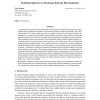Free Online Productivity Tools
i2Speak
i2Symbol
i2OCR
iTex2Img
iWeb2Print
iWeb2Shot
i2Type
iPdf2Split
iPdf2Merge
i2Bopomofo
i2Arabic
i2Style
i2Image
i2PDF
iLatex2Rtf
Sci2ools
129
click to vote
JMLR
2011
2011
Multitask Sparsity via Maximum Entropy Discrimination
A multitask learning framework is developed for discriminative classification and regression where multiple large-margin linear classifiers are estimated for different prediction problems. These classifiers operate in a common input space but are coupled as they recover an unknown shared representation. A maximum entropy discrimination (MED) framework is used to derive the multitask algorithm which involves only convex optimization problems that are straightforward to implement. Three multitask scenarios are described. The first multitask method produces multiple support vector machines that learn a shared sparse feature selection over the input space. The second multitask method produces multiple support vector machines that learn a shared conic kernel combination. The third multitask method produces a pooled classifier as well as adaptively specialized individual classifiers. Furthermore, extensions to regression, graphical model structure estimation and other sparse methods a...
Related Content
| Added | 14 May 2011 |
| Updated | 14 May 2011 |
| Type | Journal |
| Year | 2011 |
| Where | JMLR |
| Authors | Tony Jebara |
Comments (0)

